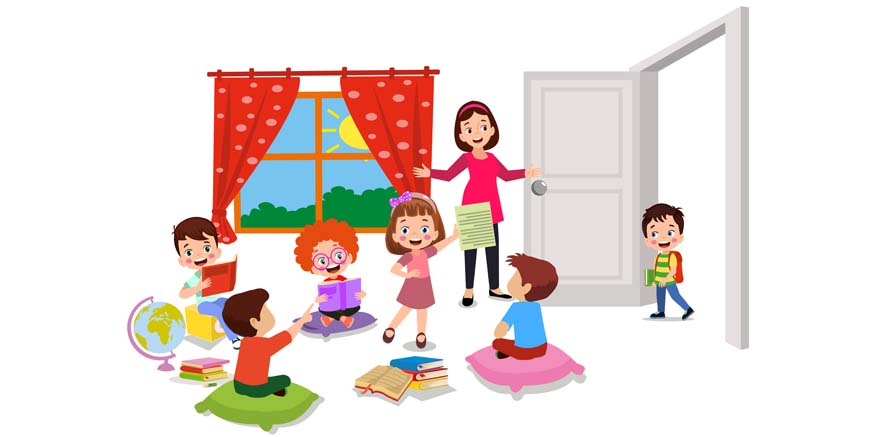Folk stories are typically anonymous, timeless, and placeless tales passed orally among various individuals. They are part of the oral heritage and are closely linked to multiple storytelling traditions like fairy tales, myths, and fables. These stories are important sources of historical context, knowledge, and information shared within every human community.
Here are some Indian stories for kids with good morals. Kids who enjoy these famous stories can learn important lessons from the characters in the tales.
- The Wedding of the Mouse
The story revolves around a sage who found a mouse while praying by the river. He turned the mouse into beautiful girl and he and his wife raised her as their own daughter who grew into a beautiful girl. When the sage decided to get her married, he first approached the Sun God, but she refused due to his intense brightness. The sage then asked the Lord of the Clouds, but she declined because of his dark and thunderous nature.
Next, the sage approached the Lord of the Wind, but she rejected him for being too feeble and restless. Finally, the sage asked the Lord of the Mountain, but she found him cold-hearted. Eventually, the sage asked the Lord of the Mountain for another suggestion, and he proposed a mouse as a groom. The girl happily agreed, as she had started her life as a mouse. The sage then turned her back into a mouse, and she got married to a suitable mouse.
Moral: Appreciate what you have and do not take blessings in life as granted.
- The Story of Akbar and Birbal
One day, Akbar and Birbal went for a walk near the lake on a cold winter day. Birbal mentioned that a man would do anything for money. Akbar dipped his finger into the lake but quickly pulled it out. He doubted if a man would spend a night in the cold lake for money. Birbal accepted the challenge to find such a person. Akbar promised a reward of a thousand gold coins. Birbal found a beggar willing to do it.
The beggar stayed in the lake all night. Akbar questioned him the next morning. The beggar survived by focusing on a street lamp nearby. Akbar decided not to reward him. The beggar asked Birbal for help. Birbal avoided court the next day. The king went to Birbal’s house and found him cooking Khichdi with a unique method. The king and his servants laughed at the sight. Akbar asked how the Khichdi would cook so far from the fire. Birbal explained that the beggar got warmth from a street lamp that was even farther away. Akbar then realised his mistake and immediately rewarded the beggar.
Moral: Never give up, put in effort and make your dream come true.
- Tenali Rama Story
Vidhyulatha, a woman known for her arrogance in the Vijayanagara Kingdom, took pride in her intelligence and accomplishments. She challenged anyone to outsmart her wit, wisdom, and intelligence by offering 1000 gold coins and put a challenge board outside her home. Despite many scholars attempting to defeat her, she remained unbeaten until a firewood vendor arrived. The vendor cleverly asked for a ‘handful grain’ as payment for his firewood, which Vidhyulatha misunderstood. After a dispute, they went to the provincial court where the vendor explained that he meant a singular grain filling a hand. Unable to comprehend this, Vidhyulatha was defeated and had to take down her challenge board and give the vendor the 1000 gold coins. The judge agreed with the vendor’s explanation, and the matter was settled. Vidhyulatha was surprised to learn that the vendor was actually Tenali Raman in disguise, who aimed to teach her a lesson in humility.
Moral: Be humble about the talents and gifts you have.
- Vikram Betaal Story – Strange Decision
King Rajendra and Queen Prema had a lovely daughter named Sona. She excelled in archery and sword fighting. When she was old enough to marry, the king wanted her to find a husband. Sona decided she would only marry someone who could defeat her in combat.
Many princes tried, but Sona defeated them all. Uday, a young man, watched Sona and learned her techniques. He eventually defeated her. When asked about his training, Uday admitted he learned by observing Sona.
However, Sona refused to marry him, and Uday respected her decision. The Betal asked King Bikram why Sona didn’t marry Uday even though he won. The king explained that since Uday learned from Sona, she was like his teacher. In their culture, a teacher cannot marry a student, so they both understood and accepted it.
Moral: If you learn anything from anyone, you should consider them as your Guru or teacher.
- The king and the foolish monkey
In an ancient Indian legend, there was a king who owned a pet monkey. This monkey was treated like a royal servant and was allowed freedoms that no other animal had. However, the monkey was not very smart and couldn’t tell the difference between doing something helpful and causing trouble. One day, while the king was sleeping with his head on the monkey’s lap, a fly started bothering him. The monkey tried to get rid of it but failed.
Determined to protect the king, when the fly landed on the king’s face, the monkey grabbed the king’s sword and accidentally killed the king while trying to kill the fly.
Moral: Sometimes having a wise enemy is better than having a fool as a friend.
Indian famous folk tales and short stories are not just ancient entertainment but also teach morals and values. These famous folk stories are rich in wisdom and reflect India’s culture and philosophy. They captivate children’s imaginations and teach important values. Each Indian famous folk tale has a timeless moral, making them essential for children’s literature.
We value these famous folk tales and the lessons they teach, and we also understand the importance of early childhood education. Mother’s Pet Kindergarten is dedicated to nurturing young minds, providing the perfect environment for these morals to take root and helping children develop with a mix of traditional wisdom and modern learning.













Recent Comments